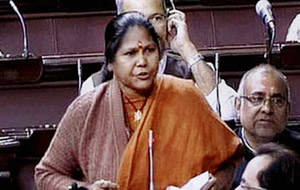New Delhi, Dec 3: The opposition demand for resignation of Union minister Sadhvi Niranjan Jyoti for making controversial remarks led to pandemonium in Parliament for the second day Wednesday, but the government refused to yield.
Members from Congress, Trinamool Congress and RSP staged a walkout after government said that the matter should end as she has already apologised and the Prime Minister has disapproved of her comments.
With Prime Minister Narendra Modi present in the House after his week-long tours, opposition members vociferously pressed for a statement from him.
They questioned as to how he was allowing a minister, who uses such abusive language, to remain in his ministry.
BJP members countered strongly the opposition attack on Ms. Jyoti, who was present in the House.
Refusing to accept the opposition demand, Parliamentary Affairs Minister M Venkaiah Naidu said the the matter has ended as she has already apologised and the Prime Minister has disapproved of her comments.
Countering the opposition, he referred to an incident during UPA rule when a central minister had allegedly made derogatory comments against Atal Bihari Vajpayee which led the then Prime Minister Manmohan Singh to apologise in the House as the minister had refused to do so.
Mr. Naidu also reminded the protesting Trinamool Congress MPs about the reported remarks of party MP Tapas Pal at a public meeting where he had allegedly threatened CPI—M cadres and their family members with rape and violence.
Anguished over the government response, the opposition members including those from the Congress, TMC and Left staged a walkout.
Rajya Sabha
A united Opposition created uproar in the Rajya Sabha while demanding resignation of Union Minister Sadhvi Niranjan Jyoti for her controversial remarks, forcing repeated adjournments.
It was trouble right from the word go with opposition also attacking Prime Minister Narendra Modi for not coming to the House to speak on the issue and wanted him to announce the “sacking” of the minister in the House.
Parliamentary Affairs Minister M Venkaiah Naidu rejected their demand citing controversial remarks made in the past by leaders from other parties as well.
BJP members engaged in angry exchange of words with those in the Opposition as the government appeared toughening its stand on the issue with a number of ministers countering the demand.
Members from Congress, SP and JD (U) trooped into the Well while those from CP-M, CPI and Trinamool Congress were on their feet rejecting the government’s argument that the matter should be treated as closed since the minister has already expressed regret.
The House was adjourned four times in the pre-lunch session because of the pandemonium.
Soon after Rajya Sabha Chairman Hamid Ansari took up obituary references after the House met for the day, Opposition members were on their feet demanding action against the minister.
Renewing his demand for passing a condemnation resolution by the House, Naresh Agrawal (SP) said, “This House does not have faith in the minister and demands that she be sacked.”
Deputy Leader of Congress Anand Sharma said the remarks made by the minister is “not only a cognisable but also compoundable offence” under section 153(A) of the IPC and demanded that the Prime Minister should come to the House and inform it that the minister has been sacked.
Section 153(A) of the IPC deals with the offence of promoting enmity between different groups on ground of religion, race, place of birth, residence and language and doing acts prejudicial to maintenance of harmony.
“We are not seeking any apology. The minister should be sacked. This is an insult to the Constitution. The Prime Minister should inform the House that the minister has been sacked,” Sharma said.





Comments
Add new comment